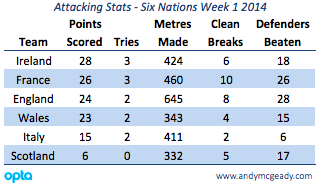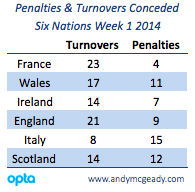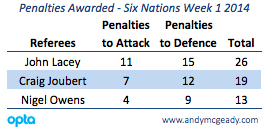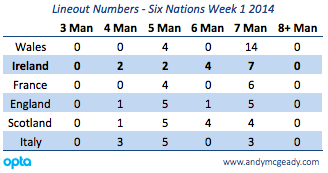Six Nations Stats – Week 1
A version of this article was published by the Irish Examiner on Tuesday, February 4th 2014: http://www.irishexaminer.com/sport/rugby/welsh-lineout-accuracy-at-six-nations-gives-food-for-thought-for-ireland-257578.html
Three games, twelve tries. And none conceded by Ireland. Much for each team to take out of the opening Six Nations weekend, even the disappointing Scots.
Italy came out onto the Cardiff turf ready to take on the reigning champions around the field. Their veteran pack might have been the most capped eight of all time to start a test match, but it might be that as a group they are not what they once were. Italy lost three of their seven scrums on their own put-in. At the base, the great Sergio Parisse made 22 carries, most of any player last weekend, and forced two turnovers.
The Welsh lineout was outstanding in securing 17 of 18 on the day with the only loss a penalty against Richard Hibbard for not throwing the ball 5m, a decision given after Hibbard had already been a good step and a half onto the pitch when he threw the ball. Wales didn’t employ a single three man lineout, or four. Or six. Rather the men in red went with four lineouts of five men and 14 with the full seven man line.
To use Ireland as a contrasting lineout example, Joe Schmidt’s forwards were more likely to mix things up in using anywhere from four to seven men. Staying in Dublin, Scotland’s lineout was appalling, losing five of their fifteen throws, while they lost two of their six scrums against the head. Of the Scots’ five lost lineouts three were clean steals; no other team conceded more than one.
Around the Aviva Stadium pitch Brian O’Driscoll started off his final Six Nations with a serious defensive effort, leading the team with twelve tackles. The brothers Kearney got their hands on the ball often with 25 carries between them of which nine were kick returns.
Scottish full back Stuart Hogg always looked threatening with ball in hand, making three initial breaks of his own and also bringing teammates into the game. Ireland made just six successful offloads on Sunday; Hogg alone completed four.
 Turnover kings of the weekend were Ireland’s Peter O’Mahony and Wales’ Taulupe Faletau with three forced turnovers each. O’Mahony was wonderfully awkward around the field, all arms and legs and aggression in the tackle area despite being one of the smaller blind side forwards in the international game. An honourable mention must go to Ireland substitute loose head Jack McGrath who in just 17 minutes on the field forced two turnovers and made eight carries. Most opponents would be happy enough to see a world class operator like Cian Healy leave the field; they’ll be less happy if McGrath makes cameo appearances of this quality a regular thing. Man of the Match Jamie Heaslip was in double figures in carries and tackling, as he seems to do so regularly.
Turnover kings of the weekend were Ireland’s Peter O’Mahony and Wales’ Taulupe Faletau with three forced turnovers each. O’Mahony was wonderfully awkward around the field, all arms and legs and aggression in the tackle area despite being one of the smaller blind side forwards in the international game. An honourable mention must go to Ireland substitute loose head Jack McGrath who in just 17 minutes on the field forced two turnovers and made eight carries. Most opponents would be happy enough to see a world class operator like Cian Healy leave the field; they’ll be less happy if McGrath makes cameo appearances of this quality a regular thing. Man of the Match Jamie Heaslip was in double figures in carries and tackling, as he seems to do so regularly.
Tim Swinson put in the most tackle attempts by a Scot (15 tackles from 18 attempts) with substitutes Pat MacArthur (7 tackles in just 13 minutes) and Alasdair Dickinson (11 from 13 attempts in 28 minutes) worth a mention for throwing themselves selflessly at Irishmen late on. Duncan Weir put in 15 tackles without a miss from fly half, a very decent shift.
 In Paris England might have lost to that late try from Gael Fickou but will have been encouraged by some excellent performances around the field. Danny Care was a constant thorn in French sides, Billy Vunipola was nigh on unplayable from number eight at times and and lock Courtney Lawes gave another performance of controlled menace. Owen Farrell, untaxed by too many penalty kick opportunities (France conceded just four penalties in the entire game), made a couple of lovely runs with the ball from the fly half slot while Jack Nowell on his international debut was game and lively. Billy Vunipola’s 17 carries in 65 mins led England’s 150 carries, most of the Six Nations weekend.
In Paris England might have lost to that late try from Gael Fickou but will have been encouraged by some excellent performances around the field. Danny Care was a constant thorn in French sides, Billy Vunipola was nigh on unplayable from number eight at times and and lock Courtney Lawes gave another performance of controlled menace. Owen Farrell, untaxed by too many penalty kick opportunities (France conceded just four penalties in the entire game), made a couple of lovely runs with the ball from the fly half slot while Jack Nowell on his international debut was game and lively. Billy Vunipola’s 17 carries in 65 mins led England’s 150 carries, most of the Six Nations weekend.
While it was an exciting game at the Stade de France it was not a true classic, with 44 turnovers conceded between the two sides. The 73 kicks in play, spread fairly evenly between English and French boots, compared somewhat unfavourably to the 47 times boot was put to ball in Dublin and the 55 times in Cardiff.
 A word for Ireland’s other Six Nations debutante this weekend, referee John Lacey, who awarded 26 penalties in the Millennium Stadium as opposed to 19 by Craig Joubert in Dublin and just 13 in Paris by Nigel Owens. While no two contests are the same, here’s hoping for more free-flowing days in future from the former Munster back.
A word for Ireland’s other Six Nations debutante this weekend, referee John Lacey, who awarded 26 penalties in the Millennium Stadium as opposed to 19 by Craig Joubert in Dublin and just 13 in Paris by Nigel Owens. While no two contests are the same, here’s hoping for more free-flowing days in future from the former Munster back.
Stats Credit: all match data courtesy of Opta.

